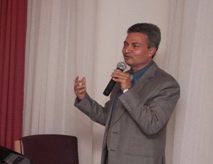
Phanindra Adhikary, Team Leader of GRM, the management service provider of ESP, spoke to NEW SPOTLIGHT on various achievements and lesson learned during the project. Excerpts:
What do you consider ESP’s achievement?
During the 13 years ESP reached to almost 2million people across Nepal. ESP has promoted inclusive governance (accountability, state responsiveness, integrity, gender equality and inclusion) in Nepal. ESP supported citizen’s access to resources, access to security and justice, promoting rights, inclusion and democracy, voter education, CA member’s capacity building support, and more importantly reaching out to people from excluded groups and remote locations of Nepal.
ESP supported strategic approach to addressing issues. For example, ESP supported the development of national strategic action plan on combating gender-based violence and its implementation. ESP supported Nepal Police, National Judiciary, Ministry of Women, Children, and Social Welfare, National Women Commission, and National Dalit Commission to develop and review strategies in the respective areas.
ESP support has contributed to changing inclusion landscape in Nepal. This might have caused tensions at times, but has also shaped an opportunity for a healthy dialogues and debates. Through which a greater understanding on how to address the exclusion issues is coming forth, and all actors are eager now than ever before to constructively engage and address the issues.
What was the focus area of ESP?
We worked in three major thematic areas – justice, equitable service delivery and deepening democracy. Justice theme included support to state security and justice agencies, combating gender-based violence, and support for community mediation in conflict affected east and central Terai-Madhes districts.
Promoting inclusive governance (that included accountability, responsiveness, integrity and gender equality and social inclusion) and supporting constructive engagement between state and non-state actors to access service delivery for the poor and marginalised people in rural areas have been ESP’s core areas of support under equitable service delivery theme.
Deepening democracy theme included ESP support for right to information and elections. The two clusters supported transparency and vertical accountability, the two important pillars of democracy.
I understand that ESP was implemented during a very difficult and challenging context of Nepal. Can you tell us how you managed implementation?
ESP has been flexible and responsive in difficult and changing contexts. During phase I (2001-05) it supported governance change agents or drivers of change – both state and non-state actors.
Following royal takeover in 2005, ESP focused its partnership with civil society organisations primarily to promote democracy and inclusion in Nepal. It implemented a multi-donor fund, the Rights Democracy and Inclusion Fund (2006-2012). ESP also supported electoral processes including two CA elections. ESP also implemented DFID’s Social Inclusion Action Programme to contribute to making Nepal more inclusive place now than in 2001 through legal framework (interim constitution), representative CA and partnership with various CSOs. The second phase of ESP (2006-11) included working both with partners and on themes.
The third phase included primarily developing strategic partnership around issues (gender-based violence, right to information, community mediation and inclusive governance). Through this approach ESP has been able to achieve good results around the themes. Without ESP some of the key activities around combating GBV, promoting right to information, and community people’s access to justice and inclusive services may not have been possible.
Please tell us about its theory of change and implementation modality.
I like to illustrate the theory of change being our partnership with state and non-state actors influencing institutional change promoting inclusive governance and service delivery.
ESP implemented 500 projects with 300 partners. The projects included 135 for deepening democracy, 122 for justice 122, 219 equitable service delivery and 34 others.
In terms of numbers ESP support may have been significantly more with CSOs, but its budget and quality of projects have been equal between the state and non-state actors.
ESP worked with State agencies, National and local civil society organisations, expert institutions and individuals, multilateral agencies and INGOs. ESP partnered with INGO where they added value and state required them, e.g., The Carter Centre for election on the request of ECN.
Which are the major state agencies that ESP partnered and supported?
Ministry of Women, Children and Social Welfare, Ministry of Law and Justice, Ministry of Federal Affairs and Local Development, Election Commission of Nepal, MoF/FCGO and National Planning Commission, Public Service Commission, National Information Commission, National Women Commission, National Dalit Commission, National Judicial Academy, Nepal Police, Nepal Administrative Staff College, Department of Prison Management, Department of Civil Personnel Records and CIAA.
What values that ESP added?
ESP didn’t just provide financial resources, but it provided hands on approach to project implementation. It worked on partners capacity and good financial management processes of partners before funding. ESP helped partners in gender equality and social inclusion mainstreaming processes within their organisations.
ESP believed in a good monitoring, evaluation and lessons learning system and accordingly worked with partners in this area. As such ESP has been able to achieve more.
ESP developed regional resource persons on GESI and management and monitoring systems so that our partners do not have to rely always on Kathmandu.
What was ESP expenditure during 2001-2013?
ESP spent about 33 million sterling pounds. This included grant and programme expenditure of 30 million sterling pounds and 3 million operating costs. About 26% have been spent for deepening democracy, about 38% for equitable service delivery and 35% for access to security and justice.
How was the reach of ESP and beneficiaries?
ESP covered Nepal’s all 75 districts and out of 3915 VDCs it reached to 1200 VDCS or 40% of the VDCs.
ESP reached to over two million beneficiaries directly. Most of them were poor and vulnerable. Female beneficiaries were 46% and male 54%.
What difference did ESP make?
Our support changes in Government Policies, National Strategies & Government Data including vulnerable groups in politics and society. Our programs also work in protecting Women and Girls, strengthening Transparency & Accountability.
Under the access to justice program, ESP supported strengthening Citizen Voice resulting in better state response, improving state capacity for inclusive governance, contributing to credible & peaceful elections and reaching the unreached. The community mediation support resulted in over 9000 disputes ensuring access to land for poor and marginalized population.
Can you briefly describe ESP’s implementation approach?
ESP invested in capacity building early on that helped to reap lasting benefits. ESP invested in long term partnership with government for sustainability and greater impact. Similarly, ESP also helped to build bridges between government and civil society to achieve greater results than working with one or the other. The program also ensured a long term approach to bring change to both formal and informal institutions.
Why ESP is closing when it is achieving so much?
As with any natural process ‘all good things come to an end – one day’ so has the ESP. ESP had a longer lifetime than some other similar programmes.
During 13 years and particularly last three years, ESP has achieved significantly in the three thematic areas. ESP is pleased to support the development of strategy to combat GBV and its implementation. It pilot around strengthening public financial management in two districts has been a success. This has been expanded to a large programme by DFID and World Bank across Nepal.
ESP has achieved a lot and also learned significantly. ESP has generated some good lesson learning products that have been shared with government, CSOs and donors so that these lessons can be taken into similar other programmes.
Though I feel sad about the closure of the programme but equally pleasing and rewarding are its contributions to changing inclusive governance landscape in Nepal.
As was informed by the DFID Head of Office during closing event, DFID will be working on a number of programmes that ESP has contributed to scaling up – security and justice, public financial management and governance facility. As such I consider that some of the good thematic work that ESP has started will be possible to continue.
Can you tell us about some specific ESP lessons?
Initial investment in capacity development support has helped in effective implementation and also contributed to sustainability.
Working with Government requires greater engagement and technical support in implementation but this supports greater sustainability and impact.
Our experiences have also shown that supporting changes in the formal rules of the game is easy but informal rules of the game will take time to change.
- MELAMCHI WATER SUPPLY: No Interruption During Monsoon
- Jun 25, 2025
- KOREAN RETURNEES: Successful Integration
- Jun 25, 2025
- UPPER TRISHULI-1: Engaging With Local
- Jun 25, 2025
- IME GROUP: Twenty Five Years Of Journey
- Jun 24, 2025
- NEPAL’S AIR POLLUTION: A Growing Health Concern
- Jun 24, 2025















